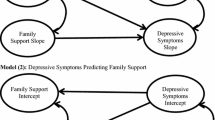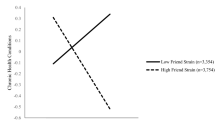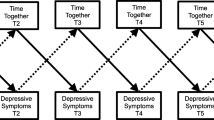Abstract
This study applies latent growth curve analysis to data from three waves of the National Longitudinal Study of Adolescent Health (n = 10,828) and finds that symptoms of depression and social support interact with one another in a dynamic fashion across the transition from adolescence (mean age at Wave 1 = 15.28 years) to young adulthood (mean age at Wave 3 = 21.65 years). Parental support during adolescence is inversely associated with initial symptoms of depression for girls and boys, although adolescent girls with low levels of parental support begin the study period with significantly higher levels of depressive symptomatology than their male counterparts. In addition, adolescents who begin the study period with higher levels of depressive symptomatology report less parental support during young adulthood. Finally, regardless of their initial level of depressive symptoms, girls and boys who experience increased symptoms of depression over time also report lower levels of parental support at the end of the study period.

Similar content being viewed by others
References
Ackard, D. M., Neumark-Sztainer, D., Story, M., & Perry, C. L. (2006). Parent-child connectedness and behavioral and emotional health among adolescents. American Journal of Preventive Medicine, 30(1), 59–66.
Aneshensel, C. S. (1992). Social stress: Theory and research. Annual Review of Sociology, 18, 15–38.
Berndt, T. J. (1989). Obtaining support from friends during childhood and adolescence. In D. Belle (Ed.), Children’s social networks and social support (pp. 308–331). New York: John Wiley and Sons.
Birmaher, B., Ryan, N. D., Williamson, D. E., & Brent, D. A. (1996). Childhood and adolescent depression: A review of the past 10 years, Part II. Journal of the American Academy of Child & Adolescent Psychiatry, 35(12), 1575–1583.
Cohen, S., & Wills, T. A. (1985). Social support, stress, and the buffering hypothesis. Psychological Bulletin, 98, 310–357.
Cornwell, B. (2003). The dynamic properties of social support: Decay, growth, and staticity, and their effects on adolescent depression. Social Forces, 81(3), 953–978.
Coyne, J. C. (1976). Toward an interactional description of depression. Psychiatry, 39, 28–40.
Curran, P. J. (2000). A latent curve framework for the study of developmental trajectories xxx adolescent substance use. In J. S. Rose, L. Chassin, C. Presson & J. Sherman (Eds.), Multivariate applications in substance use research: New methods for new questions (pp. 1–42). Mahwah, NJ: Erlbaum.
Dornbusch, S. M. (1989). The sociology of adolescence. Annual Review of Sociology, 15, 233–259.
Dow, M. G., & Craighead, W. E. (1987). Social inadequacy and depression: Overt behavior and self-evaluation processes. Journal of Social and Clinical Psychology, 5(1), 99–113.
Franks, P., Shields, C., Campbell, T., McDaniel, S., Harp, J., & Botelho, R. J. (1992). Association of social relationships with depressive symptoms: Testing an alternative to social support. Journal of Family Psychology, 6(1), 49–59.
Hammen, C., & Peters, S. D. (1977). Differential responses to male and female depressive reactions. Journal of Consulting & Clinical Psychology, 45, 994–1001.
Hammen, C., & Peters, S. D. (1978). Interpersonal consequences of depression: Reactions to men and women enacting a depressed role. Journal of Abnormal Psychology, 87, 322–332.
Harker, K. (2001). Immigration generation, assimilation, and adolescent psychological well-being. Social Forces, 79, 955–980.
Helsen, M., Vollebergh, W., & Meeus, W. (2000). Social support from parents and friends and emotional problems in adolescence. Journal of Youth & Adolescence, 29, 319–335.
Herman-Stahl, M., & Petersen, A. C. (1996). The protective role of coping and social resources for depressive symptoms among young adolescents. Journal of Youth & Adolescence, 25(6), 733–753.
Hoffman, M. A., Ushpiz, V., & Levy-Shiff, R. (1988). Social support and self-esteem in adolescence. Journal of Youth & Adolescence, 17(4), 307–316.
Johnson, T. P. (1991). Mental health, social relations, and social selection: A longitudinal analysis. Journal of Health & Social Behavior, 32, 408–423.
Kessler, R. C., & McLeod, J. D. (1984). Sex differences in vulnerability to undesirable life events. American Sociological Review, 49(5), 620–631.
Laible, D. J., & Gustavo, C. (2004). The differential relations of maternal and paternal support and control to adolescent social competence, self-worth, and sympathy. Journal of Adolescent Research, 19(6), 759–782.
Lewinsohn, P. M. (1974). A behavioral approach to depression. In R. J. Friedman & M. M. Katz (Eds.), The psychology of depression: Contemporary theory and research (pp. 157–178). New York: Wiley.
Lewinsohn, P. M., Roberts, R. E., Seeley, J. R., Rhode, P., Gotlib, I. H., & Hops, H. (1994). Adolescent psychopathology: II. Psychosocial risk factors for depression. Journal of Abnormal Psychology, 103(2), 302–315.
McLaughlin, J., Horwitz, A. V., & White, H. R. (2002). The differential importance of friend, relative and partner relationships for the mental health of young adults. Social Networks and Health, 8, 223–246.
Monroe, S. M. (1988). The social environment and psychopathology. Journal of Social and Personal Relationships, 5, 347–366.
Muthen, B. O. (1998–2004). Mplus Technical Appendices. Los Angeles: Muthen and Muthen.
Muthen, L. K., & Muthen, B. O. (1998–2004). Mplus User’s Guide (Third ed.). Los Angeles: Muthen and Muthen.
Nada Raja, S., McGee, R., & Stanton, W. R. (1992). Perceived attachments to parents and peers and psychological well-being in adolescence. Journal of Youth & Adolescence, 21(4), 471–485.
Puig-Antich, J., Lukens, E., Davies, M., Goetz, D., Brennan-Quattrock, J., & Todak, G. (1985a). Psychosocial functioning in prepubertal major depressive disorders: Interpersonal relationships after sustained recovery from an affective episode. Archives of General Psychiatry, 42, 511–517.
Puig-Antich, J., Lukens, E., Davies, M., Goetz, D., Brennan-Quattrock, J., & Todak, G. (1985b). Psychosocial functioning in prepubertal major depressive disorders: I. Interpersonal relationships during the depressive episode. Archives of General Psychiatry, 42(5), 500–507.
Roberts, R. E., & Bengston, V. L. (1993). Relationships with parents, self-esteem, and psychological well-being in young adulthood. Social Psychology Quarterly, 56, 262–277.
Roberts, R. E., Roberts, C. R., & Chen, Y. R. (1997). Ethnocultural differences in prevalence of adolescent depression. American Journal of Community Psychology, 25(1), 95–110.
Schraedley, P. K., Gotlib, I. H., & Hayward, C. (1999). Gender differences in correlates of depressive symptoms in adolescents. Journal of Adolescent Health, 25, 98–108.
Schuster, T. L., Kessler, R. C., & Aseltine, R. H. (1990). Supportive interactions, negative interactions, and depressed mood. American Journal of Community Psychology, 18, 423–438.
Shek, D. T. (2005). Paternal and Maternal Influences on the Psychological Well-Being, Substance Abuse, and Delinquency of Chinese Adolescents. Journal of Clinical Psychology, 61(3), 219–234.
Shulman, S., & Seiffge-Krenke, I. (1997). Fathers and adolescents: Developmental and clinical perspectives. New York: Routledge.
Sroufe, L. A., Carlson, E. A., Levy, A. K., & Egeland, B. (1999). Implications of attachment theory for developmental psychopathology. Development & Psychopathology, 11, 1–13.
Steinberg, L., & Silverberg, S. B. (1986). The vicissitudes of autonomy in early adolescence. Child Development, 57, 841–851.
Stolz, H. E., Barber, B. K., & Olsen, J. A. (2005). Toward disentangling fathering and mothering: An assessment of relative importance. Journal of Marriage & Family, 67(4), 1076–1092.
Thoits, P. A. (1982). Conceptual, methodological, and theoretical problems in studying social support as a buffer against life stress. Journal of Health & Social Behavior, 26, 352–364.
Thoits, P. A. (1999). Self, identity, stress, and mental health. In C. S. Aneshensel & J. C. Phelan (Eds.), Handbook of sociology of mental health (pp. 345–368). New York: Kluwer Academic/Plenum Publishers.
Umberson, D., Chen, M. D., House, J. S., & Hopkins, K. (1996). The effect of social relationships on psychological well-being: Are men and women really so different?. American Sociological Review, 61(5), 837–857.
Vandervoort, D. (1999). Quality of social support in mental and physical health. Current Psychology, 18(2), 205–223.
Wildes, J. E., Harkness, K. L., & Simons, A. D. (2002). Life events, number of social relationships, and twelve-month naturalistic course of major depression in a community sample of women. Depression and Anxiety, 16, 104–113.
Acknowledgements
This research uses data from Add Health, a program project designed by J. Richard Udry, Peter S. Bearman, and Kathleen Mullan Harris, and funded by a grant P01-HD31921 from the National Institute of Child Health and Human Development, with cooperative funding from 17 other agencies. Special acknowledgment is due Ronald R. Rindfuss and Barbara Entwisle for assistance in the original design. Persons interested in obtaining data files from Add Health should contact Add Health, Carolina Population Center, 123 W. Franklin Street, Chapel Hill, NC 27516-2524 (addhealth@unc.edu). The author acknowledges the Robert Wood Johnson Foundation Health & Society Scholars program for its financial support and thanks Debra Umberson, Robert Crosnoe, Catherine Ross, John Mirowsky, and Jennifer Matjasko for helpful comments on an earlier draft of this manuscript.
Author information
Authors and Affiliations
Corresponding author
Rights and permissions
About this article
Cite this article
Needham, B.L. Reciprocal relationships between symptoms of depression and parental support during the transition from adolescence to young adulthood. J Youth Adolescence 37, 893–905 (2008). https://doi.org/10.1007/s10964-007-9181-7
Received:
Accepted:
Published:
Issue Date:
DOI: https://doi.org/10.1007/s10964-007-9181-7




